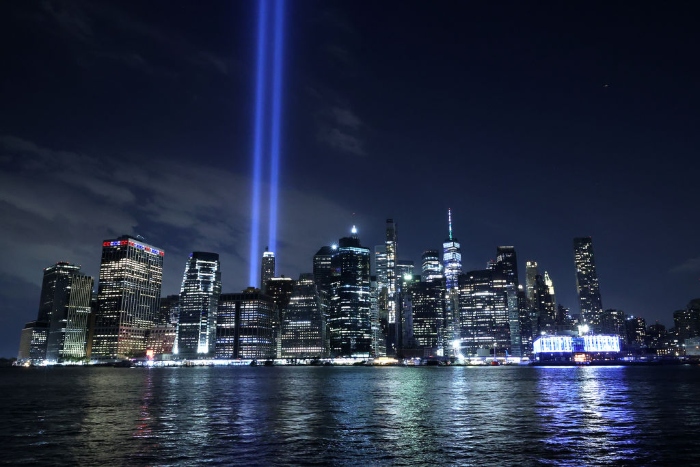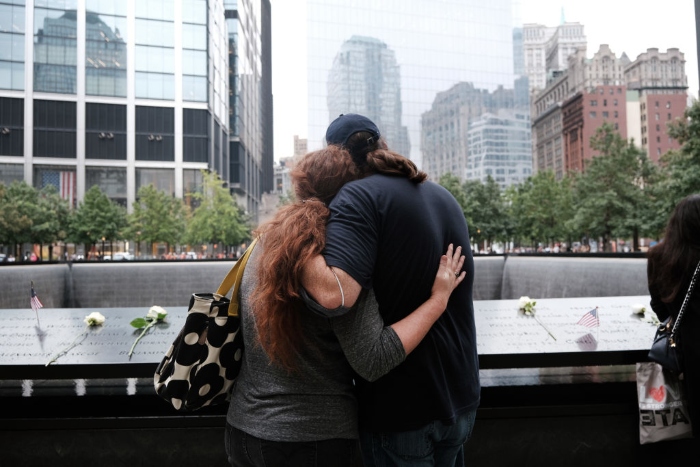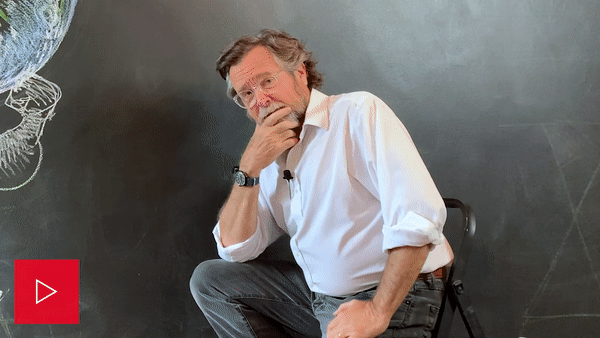| | |  | BY MYAH WARD | | | 
The Tribute In Light shines into the sky from Lower Manhattan as seen from Brooklyn. | Chip Somodevilla/Getty Images | THE DAYS AFTER — For every American who wasn’t a young child or not yet born that day, memories of Sept. 11, 2001, have once again arrived. To help reflect on the two decades that have passed, Nightly asked a collection of experts: Is America safer today than it was on Sept. 10, 2001? These responses have been edited. “The U.S. held a commanding military advantage over Russia and China on Sept. 10, 2001. While America fought the War on Terror, Russia and China dramatically ramped up their conventional and strategic capabilities. At the same time, U.S. forces, other than those engaged in counter insurgencies, were decimated by Obama-era defense sequestration. Consequently, the U.S. edge over our great power competitors has been significantly diminished, and America is less safe than it was 20 years ago.” — Robert C. O’Brien, national security adviser under Trump administration from 2019 to 2021 “We have not experienced an attack like that in 20 years — so, in that sense, we are safer. Many of the steps we took after 9/11 were very effective. We denied al Qaeda sanctuaries in countries around the world. We placed financial sanctions on both terrorist groups and countries that harbor them. We hardened our airports and transit sites to make it more difficult for weapons to be carried and terrorists to travel. The government has worked with the Muslim American community to address potential radicalization. These are just a couple of examples. “At the same time, some of the steps we took had the potential to make us less safe — including the rounding up of Muslim American men immediately after 9/11. “One big source of worry for me and for many others in the national security community is the lack of cohesion in our society generally. Each of the 9/11 Commission recommendations in Chapter 13 begins with the word ‘unity.’ We have anything but unity in our country today, with alternate realities fueling mistrust and, too often, demagoguery rather than leadership. This is truly dangerous in that it both foments domestic terrorism and undermines our defenses against foreign terrorism and foreign enemies generally. Our adversaries know how to exploit the fissures in our society. We can’t afford to give them that opportunity.” — Jamie Gorelick, deputy attorney general in the Clinton administration Welcome to POLITICO Nightly. More experts are below, including Rep. Adam Kinzinger and former cybersecurity director Chris Krebs. Reach out with news, tips and ideas for us at nightly@politico.com. Or contact tonight’s author at mward@politico.com and on Twitter at @MyahWard.
| |
| | A message from Bank of America: As part of Bank of America’s $1.25 billion, five-year commitment to advance racial equality and economic opportunity, the bank has committed $25 million to a jobs initiative that will enhance up-skilling and reskilling for Black and Hispanic-Latino individuals. Watch to see how this is preparing Delaware State University students for jobs of the future. | | | “It’s important to divide this into tactical success and strategic success. We’ve had a lot of tactical success since 9/11 fixing the specific holes that the Sept. 11th hijackers used to carry out their attacks. “But by any strategic measure, we are less safe today, and the path that the U.S. chose after 9/11 is the direct cause of that peril. Our cynical and dark pursuit of the war on terror — black sites, torture, Gitmo, drones — created more terrorists in more places. Our unrelenting focus on only one specific type of terror — Islamic extremism — led us to overlook all manner of other threats, big and small, from domestic white supremacists (who have killed more Americans since 9/11 than al Qaeda has) to geopolitical threats like Russia and China. Plus our bungling of so many steps of this has left the U.S. more alone in the world. “Then there are the new threats: Cybersecurity-wise, we’re in just terrible shape. America today faces more adversaries and enemies in more places on more fronts than we did on Sept. 10, and many of them are the direct result of our misguided War on Terror.” — Garrett M. Graff, author of “The Only Plane in The Sky: An Oral History of 9/11” “On Sept. 10, 2001, the United States was aware of al Qaeda and their intentions to attack the United States homeland. Today, the United States needs to track and contain the threat of terrorism from at least a dozen countries around the world. Our chaotic, unprepared, shortsighted departure from Afghanistan has made us look weak and showed a severe lack of confidence by our Commander-in-Chief. “Twenty years ago, we witnessed the worst attack on American soil since Pearl Harbor — a terrorist attack that claimed 2,977 innocent lives and shook this nation, and the world, to its core. We vowed to never give up, and to make our strength known. But now, we’re begging the Taliban to let us get Americans out that we left behind last month and failing to keep our promises to the brave men and women who risked their lives to help us. It’s shameful, and it is not the America I signed up to defend.” — Rep. Adam Kinzinger (R-Ill.) “In terms of attacks on the U.S. homeland, there is no doubt that the United States is much safer from attacks by transnational groups compared to 20 years ago. This is largely attributable to the operational degradation of al Qaeda and the Islamic State and the targeting of their leaders, either through direct action or through global partnerships. “However, the threat to the United States’ global interests and its citizens abroad still remains potent. The U.S. counterterrorism infrastructure has been unable to undermine the ideology and resolve of transnational terrorist groups. The fusion of local militant groups with the global affiliates of transnational brands can pose a threat to American interests abroad. In particular, the blending of local militant groups with transnational affiliates can internationalize local groups’ agendas to include Western targets, facilitate terrorist innovation and the adoption of extreme tactics, as well as trigger the movement of foreign fighters.” — Amira Jadoon, professor at the Combating Terrorism Center and the Department of Social Sciences at the U.S. Military Academy at West Point “From the terrorist threat we faced at the time, we’re absolutely safer. But unfortunately, the world has become a much more complicated — and dangerous — place in the meantime. “Threats all around us pose significant challenges to the safety, security and stability of America: cyber threats, disinformation, pandemics, natural disasters, lack of trust in institutions, and increased polarization and radicalization. Then you have the rise of China and the never-ending malignancy of Russia. “It’s clear the risks we face as a nation have evolved and our institutions must evolve with them. It’s time to reimagine the bureaucracy we established in the wake of 9/11, by separating, reforming and refocusing the mission of the Department of Homeland Security that has become, in effect, too big to succeed. In its place we need a national resilience-focused Cabinet Department tackling emerging threats like cybersecurity, natural disasters, disinformation and extremism. “A separate Department should focus on border and immigration — politically fraught mission areas that have negatively affected the ability of the other parts of today’s DHS to excel. We must incorporate the lessons learned from that tragic day 20 years ago, remain agile and adapt to the changing threat environment around us.” — Chris Krebs , former director, Cybersecurity and Infrastructure Security Agency, 2018-2020, and founding partner of Krebs Stamos Group
| |
| | STEP INSIDE THE WEST WING: What's really happening in West Wing offices? Find out who's up, who's down, and who really has the president’s ear in our West Wing Playbook newsletter, the insider's guide to the Biden White House and Cabinet. For buzzy nuggets and details that you won't find anywhere else, subscribe today. | | | | | | | — New CDC studies show waning vaccine effectiveness against hospitalization in elderly: Covid-19 vaccines continue to work well at preventing severe disease for the vast majority of Americans but they are becoming less effective at blocking infection, according to a series of studies the CDC released today. Two of the analyses suggest that as the Delta variant spread this summer, the shots became less effective at keeping people 75 and older out of the hospital. — Apple wins mixed ruling in Epic antitrust suit: A federal judge sided with Apple today, finding that the iPhone maker isn’t violating antitrust law by imposing tight restrictions on app developers and charging a 30 percent commission for digital goods and services offered on its platforms. The decision by U.S. District Judge Yvonne Gonzalez Rogers was a blow to Epic Games, the maker of the popular video game Fortnite, which had sought to ride a wave of anti-big tech sentiment with a suit targeting Apple’s lucrative App Store. However, Gonzalez Rogers found that Apple has been violating California state laws by writing contracts with developers that prohibit them from telling customers that cheaper options exist online outside the App Store. She ordered the company to eliminate those provisions.
| |
| | A message from Bank of America:  
| | | — Democrats plan stopgap to avert September shutdown: House Democrats plan to pass a stopgap spending bill the week of Sept. 20 to wave off the threat of a government shutdown at month’s end . Majority Leader Steny Hoyer (D-Md.) privately told Democrats of the plan today, according to sources on the call. Party leaders are eyeing Dec. 10 as a possible end date for a continuing resolution to keep the government open beyond Sept. 30, although the length of that patch has yet to be finalized. — Giuliani associate pleads guilty in foreign donation scheme: An associate of Trump lawyer and former New York Mayor Rudy Giuliani pleaded guilty today to illegally funneling foreign donations into U.S. political campaigns as part of an effort to win licenses in the legal marijuana business. As part of a plea deal with prosecutors, Igor Fruman, 56, admitted to soliciting a foreign national for donations to both state and federal campaigns. During a hearing in federal court in Manhattan, neither prosecutors nor Fruman’s attorney discussed specific details of the donations or identified the recipients of the money, but Fruman did agree that the sums involved exceeded $25,000.
| | | 
People embrace at the 9/11 Memorial in New York City. | Spencer Platt/Getty Images | Nightly asked you: Are you too young to remember living through Sept. 11, 2001, or were you born after it? What is your first memory of learning about 9/11? How did you find out about what happened that day? Your lightly edited responses: “I was born in April 1998, so I was 3 years old when 9/11 occurred. I had an aunt and uncle that lived in New York City, both of whom worked in the downtown area, and my mom could not get in touch with them. I believe I remember my mom being nervous and upset that day, which was unusual to me as a 3-year-old. However, I’m not sure if it’s a true memory or one that I have created over time because I wanted to have some memory of such a defining moment in American history.” — Addie Stone, government outreach program specialist, Austin, Texas “I was 2 in 2001, and one of my first memories of discussing 9/11 was on its 7th anniversary, when I was in 4th grade. My teacher asked the class who was behind the attack, and one of my friends bravely ventured a wildly incorrect guess. Our teacher became upset at us for our ignorance, which felt unfair, given our age when it happened and our inability as 4th graders to understand the tragedy. Now that I’m older, I realize her anger was likely due to lingering grief for what she remembered and the country’s confusion about the wars in faraway places that followed the attack.” — Emily Froude, immigration legal assistant, Washington, D.C. “I was almost 5 years old during 9/11, but I still remember when my grandmother rushed me into the small closet in her apartment after the second plane hit, as she was afraid a plane or bomb might hit us next. Sometimes I wonder if some of my memories that I have of the entire sequence I didn’t create myself, based on some amalgamation of footage and memory.” — Justen Glover, paralegal, Laramie, Wyo. “I was 3 years old, and it was my second day of preschool on 9/11. I do have a memory of that day — at some point I walked by or looked at a TV and saw the explosion from the second tower and the orange fireball from it stayed with me — it’s actually my very first memory. But being only three I couldn’t comprehend any of it. Over time I think I just subtly absorbed what happened. I’m from Columbus, Ohio, and one of the skyscrapers in town looks a little like the World Trade Center, similar windows and boxiness, and I remember being 4 years old and from the backseat of our minivan telling my Mom, ‘Look, it’s the Twin Tower.’ Again, I always knew about it, but it wasn’t really until the mid- to late-2000s when all of the documentaries started playing on TV that I truly could understand what took place that day. Elementary school teachers also helped to explain to us what happened and once I entered middle school, YouTube allowed access to all sorts of visuals from that day.” — Matthew Houk, special projects coordinator, Columbus, Ohio
| | | |
| | | NATION-BUILDING IN THE U.S. — Between the 9/11 anniversary, the continued fallout in Afghanistan and the fight to rein in the Delta variant, Americans have a lot on their minds. But Matt Wuerker still managed to find the best in political satire and cartoons for his latest Weekend Wrap.
| 
| | |
| | HAPPENING WEDNESDAY - POLITICO TECH SUMMIT: Washington and Silicon Valley have been colliding for some time. Has the intersection of tech, innovation, regulation and politics finally reached a tipping point? Join POLITICO for our first-ever Tech Summit to explore the evolving relationship between the power corridors of Washington and the Valley. REGISTER HERE. | | | | | | | ‘WHERE WE TRIPPED OVER OUR SHOELACES’ — On Thursday, we previewed Bryan Bender and Daniel Lippman’s cover story in POLITICO Magazine about talking to 17 architects of the post-9/11 order. Here are two more excerpts from the full piece. Former Homeland Security Secretary Michael Chertoff: “One of the things I think was a deficiency was the handling of detainees, in terms of how to adjudicate them. … It is great to incapacitate the terrorist and put them in lockdown, but what next? And the fact we still haven’t had a complete trial in 20 years and [9/11 mastermind] Khalid Sheikh Mohammed is still sitting there and we haven’t had a final judgment suggests to me that there was insufficient thought up front about how this plays out.” Former Deputy Secretary of Defense Paul Wolfowitz: “The fact that we don’t know whether [there was] any connection [Saddam Hussein] had to al Qaeda doesn’t change the fact that this is a man who had had all those weapons of mass destruction, once upon a time at least. He did have weapons of mass destruction. I think it was a mistake, by the way, not to emphasize that we were trying to prevent him getting new ones, not that we had some magic intelligence that told us he had big stockpiles. That’s sort of where we tripped over our shoelaces.”
| |
| | A message from Bank of America: “A college education is fundamentally important for the long-term prospects of any American, but particularly for those from underserved communities,” says Dr. Tony Allen, president of Delaware State University.
Learn more about Bank of America’s partnership with DSU to give students the opportunity to change their lives and transform communities. | | | Did someone forward this email to you? Sign up here. | |
|
| | Follow us on Twitter | | | FOLLOW US
|
| |

No comments:
Post a Comment